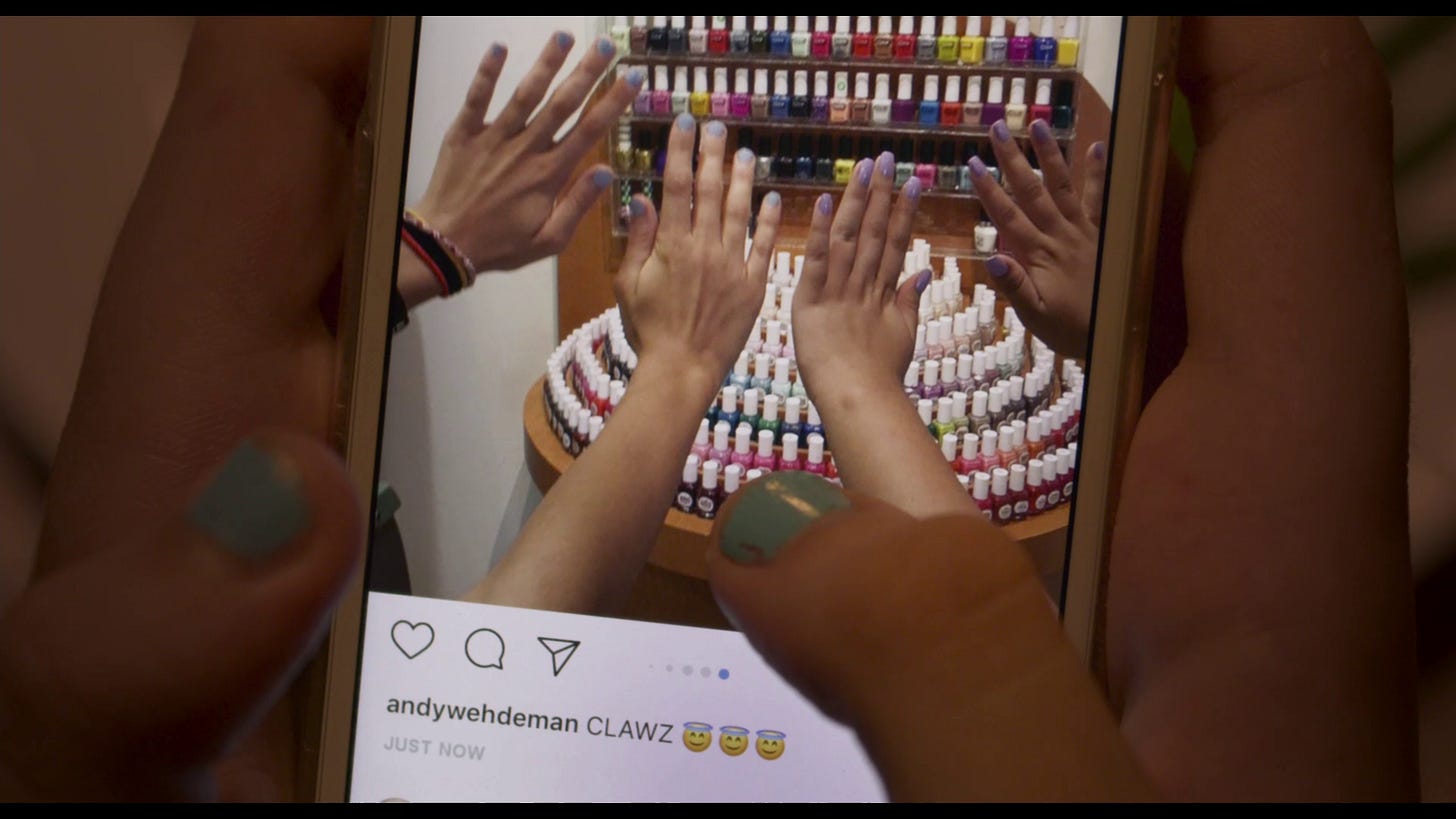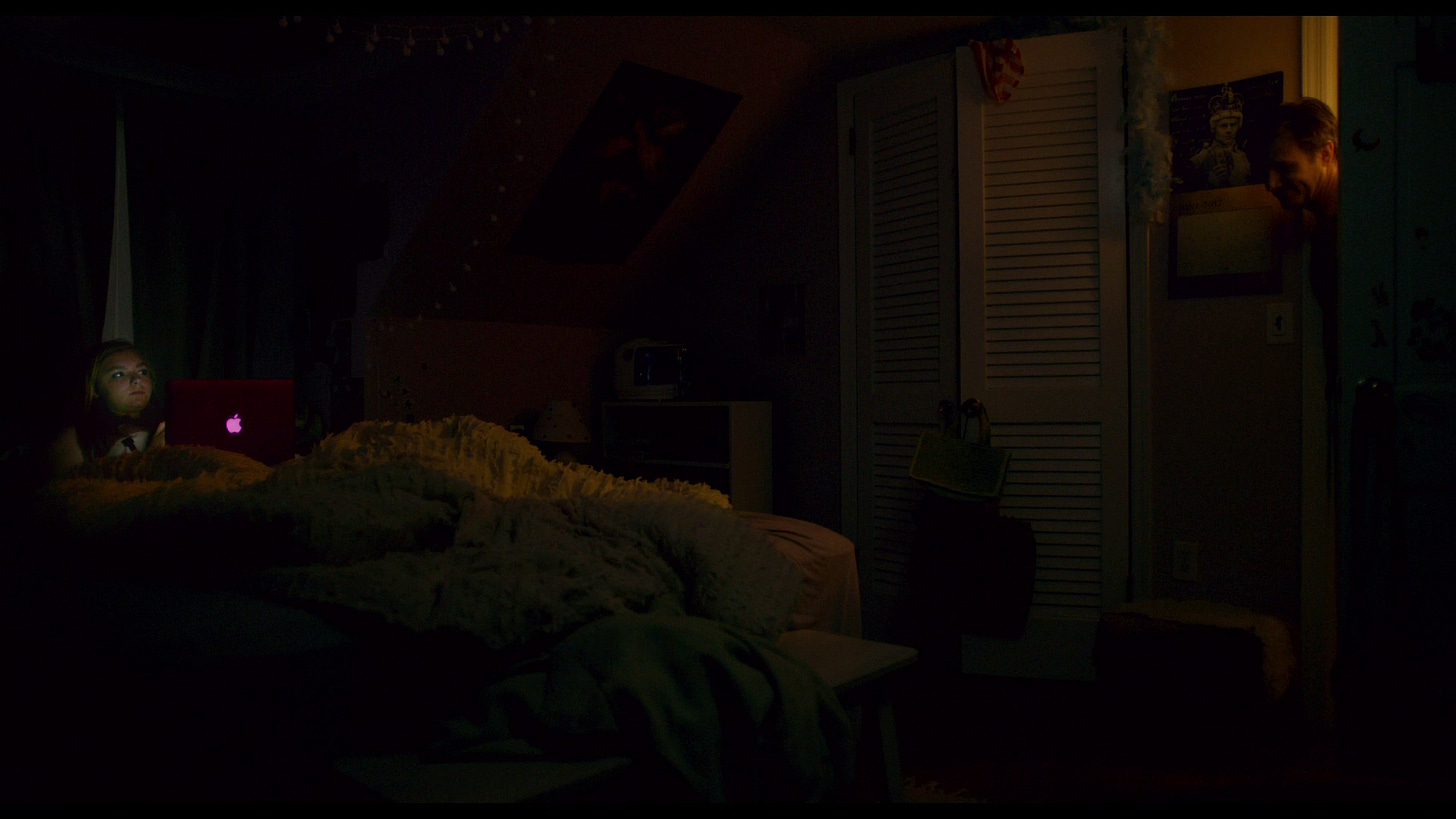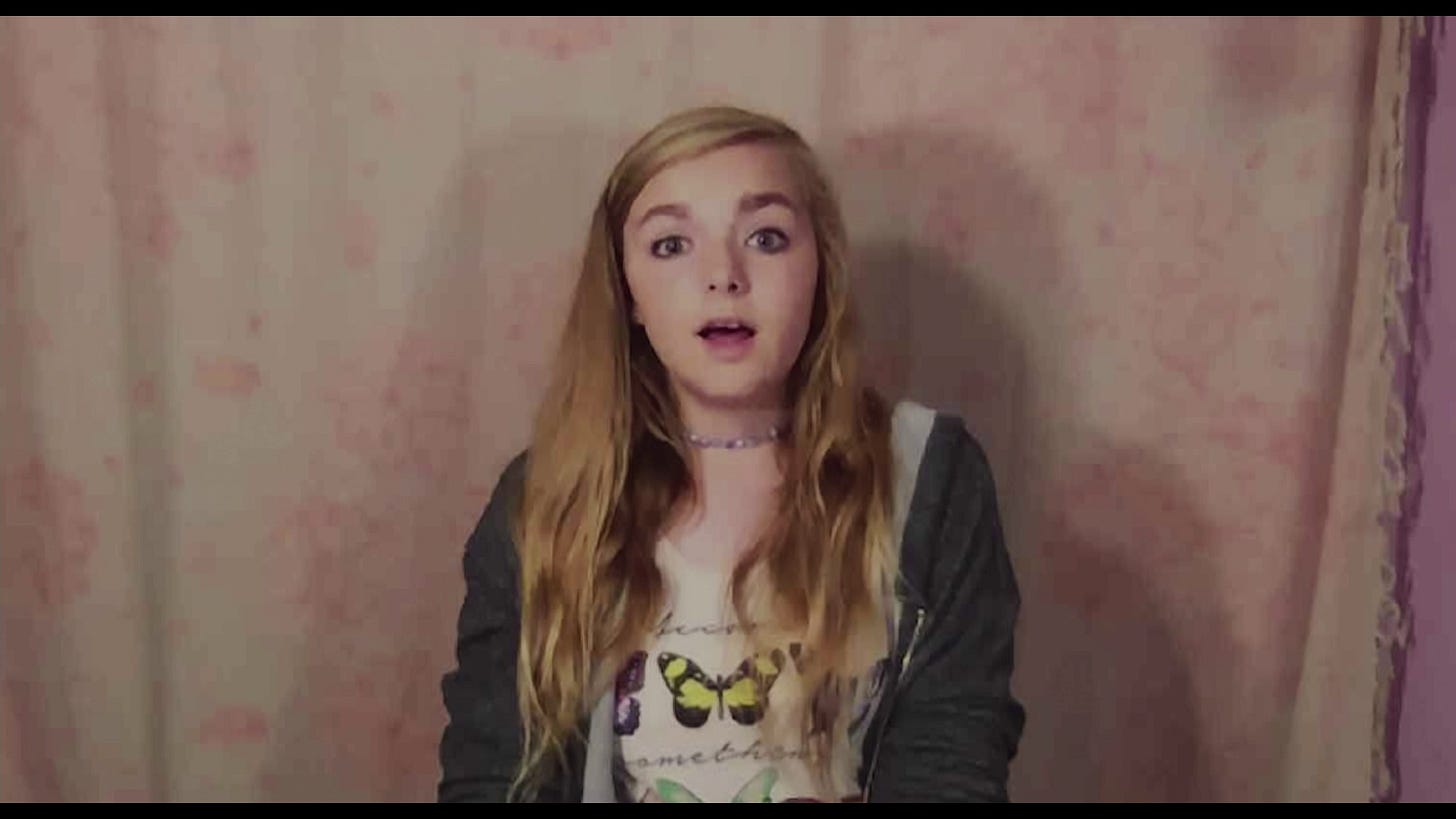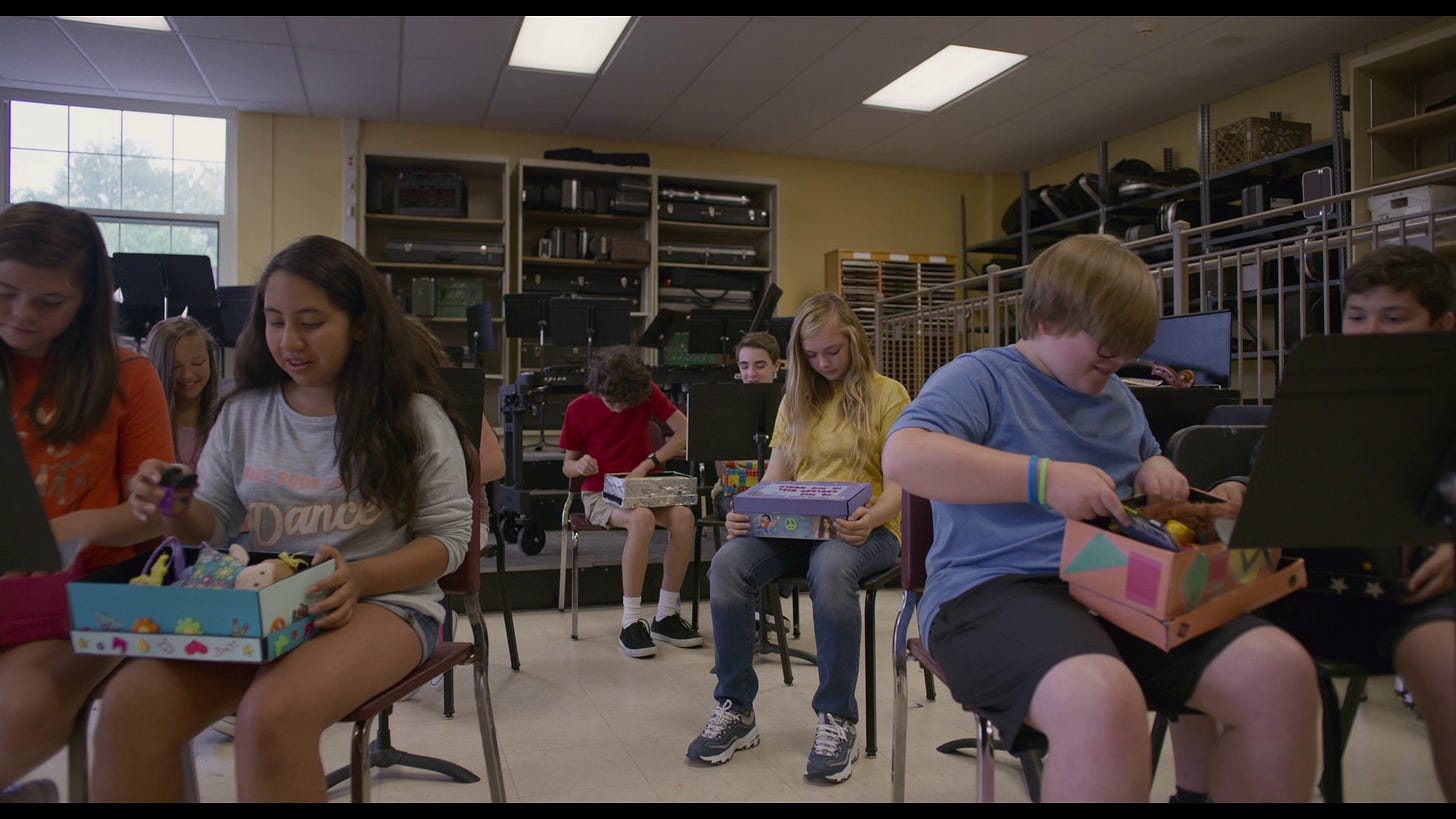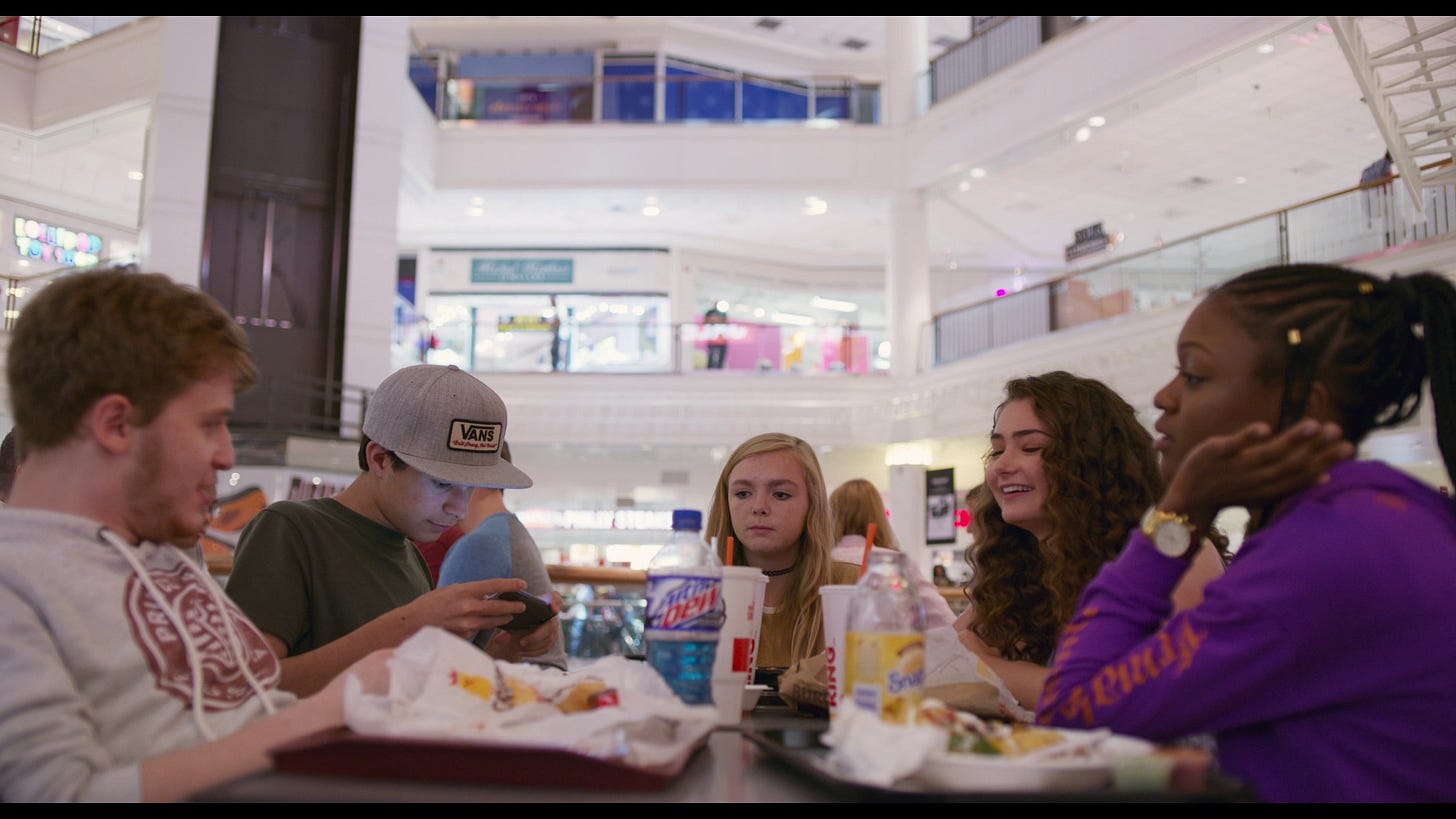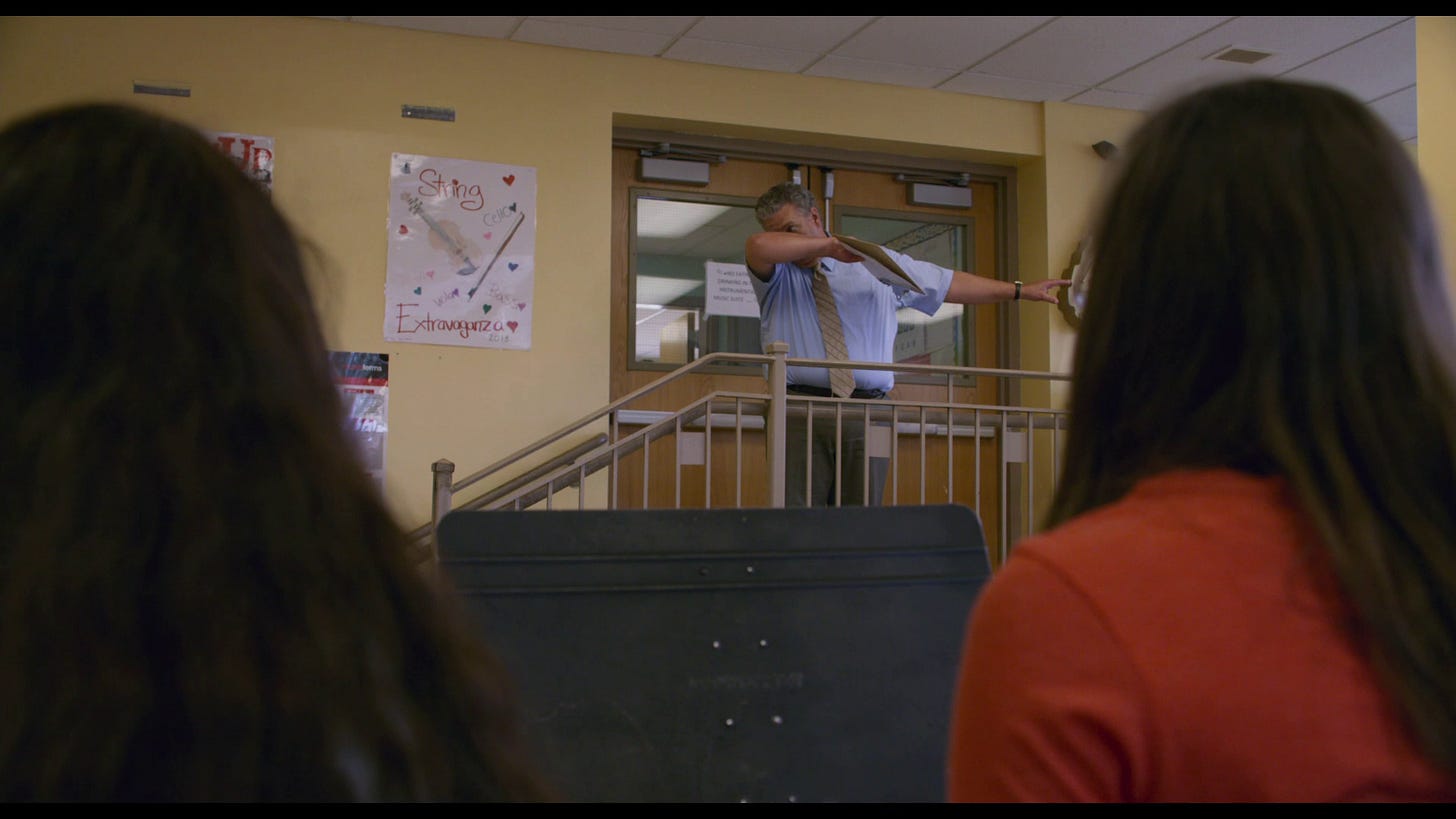"Eighth Grade" -- A No-Risk Movie You Must Watch
This 2018 movie nails the "Anxious Generation," or our stereotypes of it
Being “old” means you are wildly out of touch. For young people these days, that’s anybody over 25.
Thankfully I teach 18-22 year-olds, which keeps me a little in touch. And so this week, three times I heard Gen-Z students rag on Gen-Alpha students.
By and large, they were annoyed by Gen-Alpha’s alleged engagement in “brainrot.” That was classified by example: the alphas say “sigma” and “skibidy,” watch neverending Twitch streams of people living life in their apartments, and listen to musicians named NBAYoungBoy and Yeat.
Hearing those words, I never know whether I’m living in “Clockwork Orange” or “Idiocracy.”
To keep me in touch, the studio A24 has completely dedicated itself to showing what the dreams of the young are, of the young skibidy-talking teens in the United States. It’s part of A24’s business model to not only make higher-brow fare, but also that kind of fare that features the lives of teens.
Among the best of these is 2018’s “Eighth Grade,” a movie I have now shown several times in film class and studied shot-for-shot and sound-for-sound.
This is a no-risk movie, meaning anybody can watch it and get a lot out of it.
But be warned: while this is a very funny movie, directed by comedian Bo Burnham, it’s cringiness outweighs its humor. Just check out the protagonist in the middle of the shot below.
Regrading the movie’s constant cringe-inducement, that’s what I’m told by my Gen-Z students, who were in eighth-grade at exactly the same time that this movie was released in 2018, depicting an introverted eighth-grade girl who feels alienated, isolated, and devastated, yet can’t act like that in public.
Very few films have depicted the common use of smartphones and social media like “Eighth Grade.”
This movie is realistic; few other films, which largely don’t showcase the high-tech dependence of young people, are realistic.
Ergo, “Eighth Grade” is part documentary, in spite of being fiction.
Its protagonist, Kayla, lives with her single father. Her mother has left at some point, a crucial detail we are told only late in the movie in passing dialogue.
The father, a lovely man who thinks his daughter is “cool,” is nevertheless somewhat clueless about what Kayla is up to. He panders to her.
Below, the father peeks his head into Kayla’s bedroom on the right. Kayla’s on the far left, right next to the glowing Apple logo on her laptop. She’s remarkably closer to that, literally here, than her father, who is far away and in the dark.
Meanwhile, she’s more outgoing to the unknown world at large. Shemakes self-help Youtube videos in which she’s the guru.
Only the videos are projected wishes about what she wants to be. The movie highlights the polar-opposite contrasts between her video advice and her behavior, almost all of which is awkward interactions with school peers.
She’s also up to typical youth stuff, such as lusting after gangly, monkey-like boys.
The movie does wonderful duty in winking at us, acknowledging that Kayla’s lusts are ridiculous, all-the-while showing that these lusts are meaningful and universal to most or all young people, like you.
Below is the kid she “loves.” His main interests are phones, pictures of girls on phones, and making weird faces while bored, which is every moment that he’s not on his phone looking at pictures of girls.
Empathy for Kayla’s plight is strong in “Eighth Grade.” And if you are not an introvert, you will get to know what it’s like to feel like one.
As Kayla describes at one point, her life is like a constant wait in a rollercoaster line, where she feels incessant butterflies in her stomach. Her school rather stupidly allows her classmates to vote her the “quietest girl” in eighth grade, to her consternation.
Here she is, right after getting the honor of being voted the quietest.
Kayla is up to normal teenage stuff, such as feeling awkward at cool-girl pool parties. And, oh yes, looking up how to perform oral sex. The advice on Youtube is free-flowing and beyond stupid.
Her dad doesn’t know about this. He might find out at one point.
The movie highlights something I’ve come to learn as well: there’s a supposed stark divide between age-categories of U.S. teenagers.
In one scene, Kayla triumphs socially by hanging out with high-schoolers at a mall. She feels abnormally awkward, though. They talk about her as being “of a different generation,” which means she started using Snapchat in fourth-grade instead of in seventh, like them.
Despite being two or three years younger, that makes her vastly different from them, much like the alleged differences between a Gen-Zer and Gen-alpha, who from my old guy vantage point — the vantage point of the father in the film — are all the same to me.
The movie seems to nail smartphone use. Kayla is addicted.
She’s also trying to find connections on it. That includes scrolling and liking constantly, even at the dinner table, ignoring her dad, while hoping that her own Youtube videos will be found and watched by all.
“Eighth Grade” depicts a very stark divide between Kayla and the adults who are the authority figures in her life.
This is literalized by depth-of-frame distanced, and it’s augmented by the adults’ errors in trying to use youth slang and youth gestures to speak like them. That’s an utter failure.
This teacher in the image below, I’m told, is doing a Cam-Newton gesture that only kids would get. He’s trying to look cool. He should know that that never has ever worked, in the history of the universe.
There’s even a bizarre scene — I am still trying to figure out if this is realistic or a Burnham exaggeration — in which a school-shooting drill involves a principal with a fake gun play-acting as a shooter himself. Instead of ducking under desks to practice nuclear-war safety, as they did in the 1950s, they duck under desks here to practice active-shooter safety in the 2010s.
That allows Kayla to go talk to the gangly kid she lusts after about her “dirty pics” folder. She’s so awkward and innocent that, not having a clue what she’s talking about, this is all more awkward-cringe than disturbing.
But it is disturbing. Like the twenty best Gen-X movies about high school life, such as “The Breakfast Club,” “Eighth Grade” will have you asking why in the world we still do school this way. Kayla’s stuck in a zoo.
She hopes to get out, which means growing up.
The entire movie has her fixated on her older self, her sixth-grade self, more upbeat and positive and pop-culture-engaged. That’s shown when the school has the kids look at their time capsules they made in sixth-grade. Here, Kayla’s confronted by her younger self. Meanwhile, she’s thinking hard about her older self, what life in high school might be like. Does it get even worse than you age?
Director Burnham, despite a lot of cringey and funny moments that poke at the oddities of eighth-graders, has tons of affections for them, especially the female protagonist.
That includes a harrowing scene in which she’s left in a car with a high-school boy. I won’t tell you what happens there, except that there is no violence. But it’s an assault nevertheless, and for those of us who have never experienced that and what that feels like, the movie does top-notch work.
That makes “Eighth Grade” seem really disturbing. But you should know that three characters are offered up as charming as any movie about this subject and time. Two are Kayla and her father.
The third is something I must not spoil. I can only say that one of the final scenes has about the best acting — as natural as possible — that you will ever find from two sub-18 year-olds.
You’ll know it when you see it.
Therefore, for us older folks, “Eighth Grade” might serve as a difficult reminder of what life was like at the weirdest of times, at least physiologically and psychologically.
But the movie combines the social acceptance and use of technology, the alienation of modern teens, their futile and yet understandable desires, the confining modern systems they are put in, the strange conundrums their parents face in relating to them, and the incessant presence of tech devices that seem to completely shape their sense of self and others.
As a no-risk movie for you, I can’t recommend “Eighth Grade” enough.








